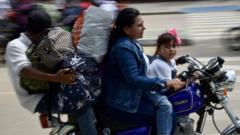The Ombudsman's Office in Colombia highlighted the urgent threat posed by these conflicts, stating that the violence disproportionately affects vulnerable groups such as children and pregnant women. Among the victims are notable community leaders, including several signatories to the peace treaty. Confirming fears of a return to a brutal civil conflict, local advocacy groups have reported increasing kidnappings and food shortages in affected areas.
President Gustavo Petro condemned the ELN's actions, accusing them of war crimes and a lack of desire for reconciliation. While the ELN alleged that the Farc instigated the conflict, the government has responded by deploying additional military forces to restore order. The cycle of violence in Catatumbo raises pressing questions about the future of peace efforts and community security in Colombia.
The Ombudsman's Office reported that 60 individuals have lost their lives due to gang-related violence in the Catatumbo region.
The report indicates that the National Liberation Army and the Revolutionary Armed Forces are clashing over control of the illicit cocaine trade.
Amid these violent events, critical concerns have emerged regarding the safety of vulnerable populations, including community leaders and families, as well as rising food shortages and displacements in the region.
President Gustavo Petro condemned the ELN's actions, accusing them of war crimes and a lack of desire for reconciliation. While the ELN alleged that the Farc instigated the conflict, the government has responded by deploying additional military forces to restore order. The cycle of violence in Catatumbo raises pressing questions about the future of peace efforts and community security in Colombia.
The Ombudsman's Office reported that 60 individuals have lost their lives due to gang-related violence in the Catatumbo region.
The report indicates that the National Liberation Army and the Revolutionary Armed Forces are clashing over control of the illicit cocaine trade.
Amid these violent events, critical concerns have emerged regarding the safety of vulnerable populations, including community leaders and families, as well as rising food shortages and displacements in the region.



















